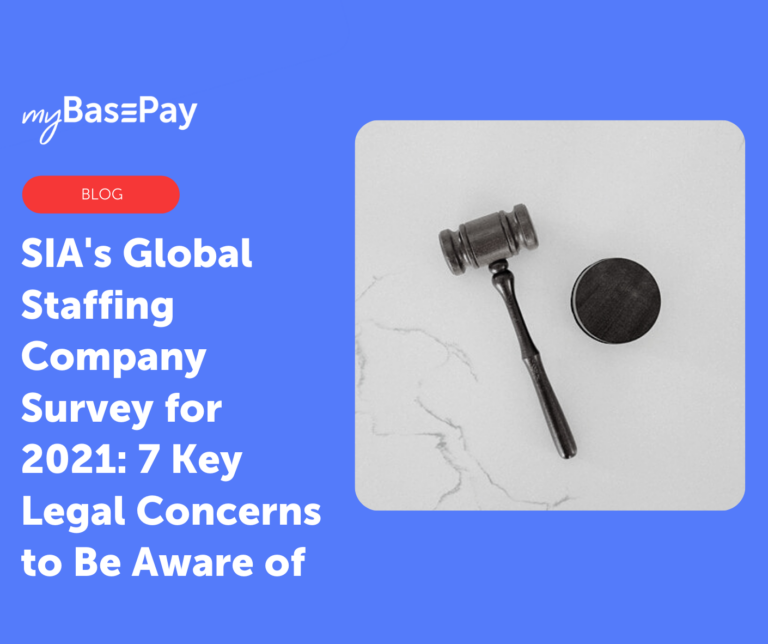4 COVID-Centric Issues All Staffing Leaders Need to Know About Moving Forward
At this point, the COVID-19 pandemic has disrupted normal staffing operations for a full two years. While many have learned to adapt to ever-changing government and client requirements in relation to the pandemic, this doesn’t mean the challenges associated with COVID have come to an end.
In fact, the ongoing changes and challenges created by COVID-19, and the myriad ways that workers and businesses have adapted to the “new normal,” creates several important issues that staffing leaders must continue to be aware of as they move forward.
By staying on top of issues stemming from COVID-19, staffing leaders can have confidence in their ability to remain fully compliant with applicable regulations, while still delivering worthwhile results to their clients.
1. Navigating Vaccination Requirements
While state mask mandates and other COVID restrictions are largely on the decline, many companies continue to have vaccine requirements in place for individuals who will be working on-site.
One of the key talking points from our presentation “What Staffing Leaders Need to Know About Compliance in the Age of COVID” at the 2022 Executive Forum North America focused entirely on this issue.
As the panelists explained, “[Vaccination status] can be considered medical information. Staffing firms cannot legally ask job applicants whether they’ve been vaccinated or not. What they can do is tell the job applicant of your requirement and then upon offering acceptance require proof.”
As the panel went on to explain, direct questions about vaccination status have to wait: “During onboarding, provide them a document that lists out the client’s policy, instructions on how to upload their vaccination card, and then permission from them to share that information with the client.”
2. Ongoing Workforce Shortages In Many Industries
Even before the so-called “Great Resignation,” many industries faced a shortage of talent. While a report from the U.S. Chamber of Commerce reveals that many workers who quit their job since the start of the pandemic have been rehired elsewhere, several industries are continuing to struggle to attract and retain talent in the wake of the pandemic.
Food service, transportation, hospitality and health care are among the sectors that have higher levels of unfilled openings. While there are many issues that can contribute to challenges in these industries (such as burnout or perceptions of low pay), an environment where there are more openings than applicants mean many businesses are hard-pressed to find the necessary talent for their operations.
Staffing firms aren’t immune to workforce challenges. They must deal with an increasingly competitive market to attract and place qualified candidates for their clients. Quality communication with candidates and collaborative efforts with clients will prove key to making successful placements.
3. Increased Proliferation of Remote Talent
As part of the response to the COVID-19 pandemic, many businesses shifted to a remote work-from-home model for full-time employees and contingent workers alike. While many businesses have since returned to the office, a significant number of organizations have embraced a hybrid model, allowing for permanent remote status for many of their employees and contractors.
While this can lower a business’s overhead associated with renting out offices and provide increased operational flexibility, it also introduces new compliance concerns with a geographically dispersed workforce.
For staffing leaders, understanding how state regulations affect remote workers, in particular, is vital for maintaining compliance in every area they work. In the “What Staffing Leaders Need to Know About Compliance in the Age of COVID” presentation, the following hypothetical scenario illustrates the complexities introduced by an increasingly remote workforce:
“We have a temporary employee working in California. We have a client in Nevada, and a staffing firm in Florida. […] So in this case, it is California law that we would be most concerned with. And I would ask, are you as the staffing firm who just placed a person in California — even for working from home, from their couch — are you familiar with California labor and employment laws?”
As the panel later advised, “Know where your workers are, because with remote working, it’s really hard to keep track. They can move from state to state and then you’re paying payroll taxes in one state while they’re in residing in a completely different state.”
The variance in laws affecting contract workers can create significant compliance challenges. Staffing firms must be aware of and compliant with all applicable regulations in the states where they hire or place workers. In some cases, they may even need to limit the jurisdictions they work in to avoid compliance issues.
4. Greater Need for Flexible, Proactive Staffing
Organizations have learned to be more flexible and agile in their approach to hiring and other vital operations. During the pandemic, many businesses learned the hard way how a reactive approach could cause them to lose valuable employees.
As a result, it should hardly be surprising that many companies have recognized the need for a more proactive and flexible approach to hiring. With demand for employees often outpacing supply, call centers, IT services and other businesses are increasingly using contingent workers to fill positions, often with the hope of turning a contingent placement into a permanent one.
At the same time, utilizing contingent workers gives businesses greater control over their operational expenses, while allowing them to adapt their workforce as needed based on changing circumstances.
This naturally creates new opportunities for staffing firms that primarily serve the contingent market. Staffing firms that can help clients attract and retain top contingent talent, while also helping them manage payroll and compliance concerns associated with temporary workers, will be better positioned to address the needs of their clients.
MyBasePay Helps You Prepare for Any Challenge
The COVID-19 pandemic will continue to make its effect felt in the staffing world for many years to come — but it is hardly the only challenge that can disrupt or alter normal staffing operations.
From changing regulatory requirements to an increasingly remote workforce, myBasePay’s full suite of back-office solutions aims to help you navigate the modern workforce with a comprehensive employer of record (EOR) model that ensures full compliance administration and provides crucial assistance in onboarding, payroll, invoicing and more to ensure zero-risk scaling.
Author: Cesar Romero
Cesar is the Head of Marketing at myBasePay, where he’s responsible for overseeing the company’s content marketing, community, and partnerships strategy. He also co-hosts The Ivy Podcast where he interviews executives from Fortune 500 companies on executive leadership. When he’s not helping startups with marketing and community strategy, you can find him paying it forward by serving as a mentor for leading organizations like StartingBloc, Hive, and Global Citizen Year.






